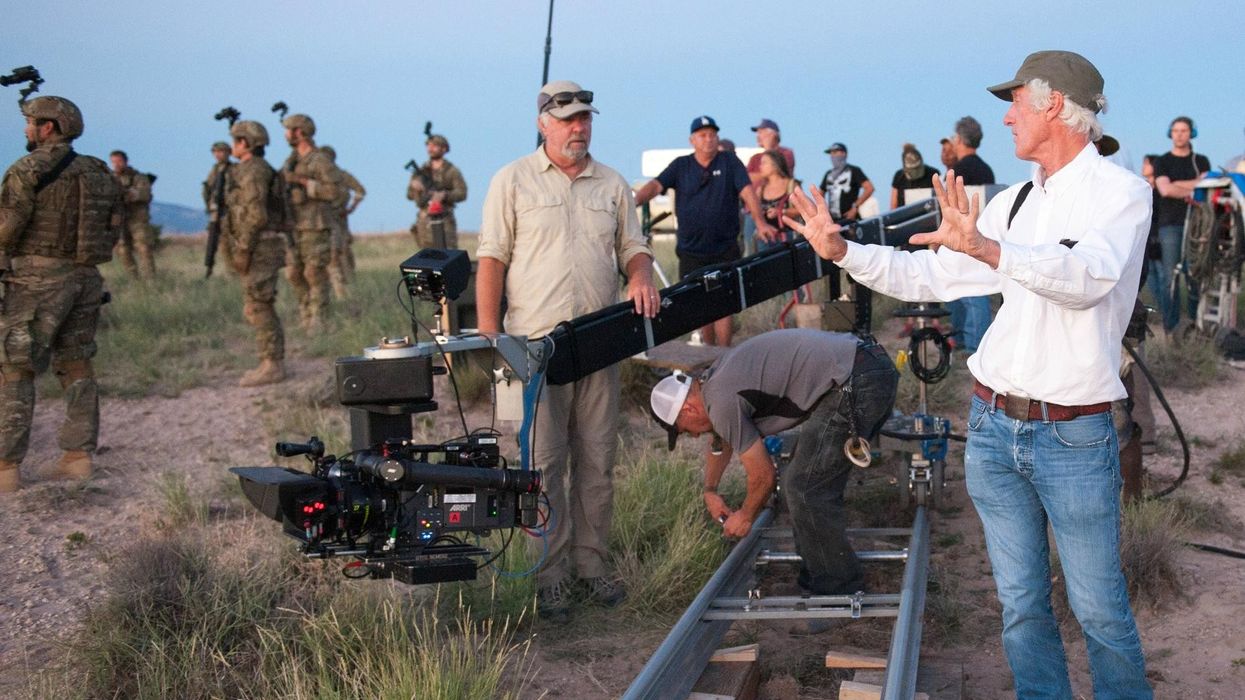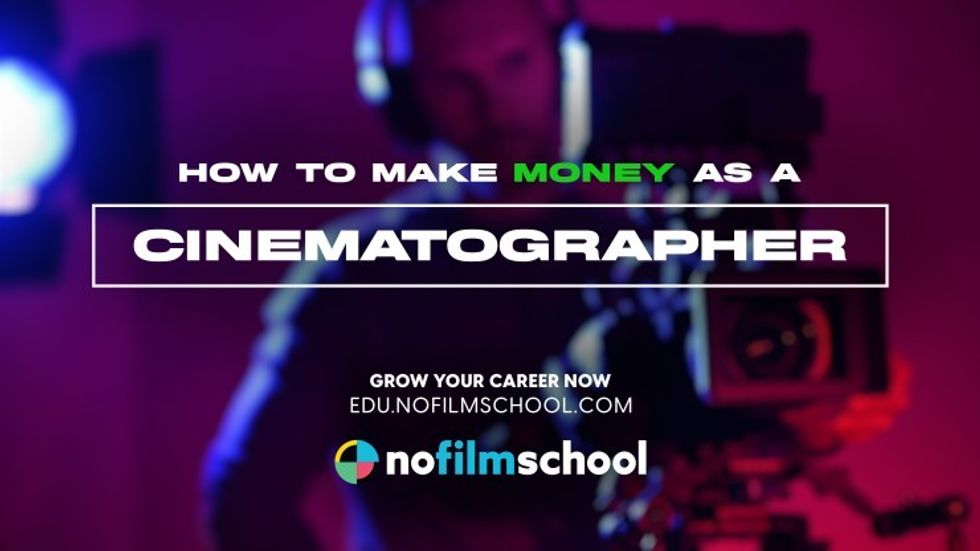How To Stand Out As A Cinematographer and Get More Work
It's not all about your talent. This is all you need to do so your work gets seen.

The following material is an excerpt from the No Film School How to Make Money as a Cinematographer course.
The art of cinematography is more than just angles and framing that excite you. Sure, you can be a weekend warrior who shoots short films and has the best photos on your Instagram, but if you want to build a career as a cinematographer, you need to master more than the camera.
What you need is persistence, consistency, and exposure. That whole heap of talent may not matter as much as you think if your wonderful work never gets seen.
It seems counterintuitive, but the way to sustain a career is not just shooting amazing work. You have to build a brand that makes you seem reliable, hardworking, and talented.
But how can you make that all feel tangible and not like a bunch of buzzwords? Let's get into some strategy for you.

How To Stand Out As A Cinematographer and Get More Work
When breaking into any industry, you're always going to have the talent to fall back on, but a leg up comes from getting your name out there and networking with the people who can pay you to do the work.
There are a few ways to get your name out there and get people familiar with your work.
Websites
Do you have a website? One of the most important ways is to make people understand who you are, what you can do, and what you've done in the past. You can showcase all of these aspects of yourself by creating a website. You can use sites like Wix or Squarespace to make your website look professional. Both cost around $16 a month, depending on the subscription tier.
In my opinion, websites are the business cards of the future. When creating one for your brand, put your best work first. While there's no definitive way a cinematographer's site should look, creatives should include a list of current work samples (if it's already been released) along with up-to-date contact information. As for how it looks, use that talent to craft something that's appealing to the eye. That's the job, after all, right?

The reason I love websites is that people can find them accidentally. They can be looking for who shot what or maybe have an inkling of the kind of work they need and stumble upon you.
Or, you can send anyone your website, and they can see what you're all about. One quick way of connecting people to the work on your site is by using QR codes. These can be quickly generated for free, printed, copied, and pasted wherever you want.

Social Media
Have a website but still need another way to develop your online presence? Right now, many cinematographers utilize social media to gain followers and connections by posting their work on a myriad of platforms.
Cinematographers are posting on TikTok, Twitter, and Instagram, using their social presence to drive traffic to their websites and build a following (or fan base) that can help them get more work. The best part of social media is that you don't always have to post your work. You could do breakdowns of famous movie shots or teach basic lighting techniques. You can show strategies, shot lists of your work, or even your own setups.
This approach allows creatives to share ideas, criticisms, and inspiration that may further help develop their unique visual style. Our business is built upon community, and social media is the perfect environment to foster one.
The point is to have a presence and a personality that can help you network through social interaction, which websites can't offer.

Cinematography Reel
No matter what you do on this list, you have to have a reel. This is a short compilation of your best work that showcases your technique for composition, framing, and lighting, as well as your creative style. It will also help a client or collaborator quickly understand if you are capable of delivering what they need, and we do mean quickly.
A good cinematography reel is all about balance. While you need to start strong and put your best work forward, no one will be impressed with that 10-minute action sequence you shot for a feature, especially if your prospective client needs a commercial for dog food.

First, consider what type of cinematographer you are and what your focus is. Do you want to work in commercials or music videos? Do you do branded content or narrative film?
If you cover all of these, consider creating a reel for different types of work. Then, when you have the first cut, ask yourself the following questions:
- Does my reel start with a strong image?
- Is a variety of my work represented in my chosen field?
- Am I repeating work/styles too often in my reel?
- Does it feel like I am “stretching” my material?
- Does my reel target the work I am pursuing (narrative, documentary, commercial, music video, etc.)?
- Is there proper contact info?
Once you've answered all these questions and refined your reel. It's time for step two. Reach out to trusted clients and colleagues (which is where social media can help) to view your work with our next set of questions in mind:
- What parts of my reel or portfolio did you like the most?
- What parts felt weak, too slow, or uninteresting?
- Did you like the music choices, and did they fit your brand/project?
- Do you feel like you have an understanding of my artistic voice from looking at my work?
These questions can help creatives further refine their reel to make sure their artistic voice is present, the length isn't too long, and the idea of their capabilities is clear.
Your reel is how you'll sell yourself to every client. Like your website, it's a business card you can attach to emails, tweet out, or just let live online for people to find.
Speaking of which...
Vimeo
So, now you have that reel. Do you email it to people? Well, you could, but your reel also needs to live in a high-quality online space and be accessible to those who need to see it. That's why we recommend putting it on Vimeo.
YouTube can also be an option, but compression is always an issue due to the high volume of material pumped through the site. Vimeo's platform, at least for now, has always been the go-to for hosting your reel, as it doesn't compress the material as much and preserves the fidelity of difficult images such as those with heavy gradients. It's as close as you can get to share your material the way you captured it.
Think about how you want these videos to live, whether that's linked on your website and social media, just as a calling card or you can send it to people with a password. The choice is yours.

But There's So Much More To Learn
What you just read were some surface-level ideas, but as you can imagine, there is much more detail to each of these topics. And these topics are just the tip of the iceberg of what you need to do to have a great career as a cinematographer.
How about what to do during a tech scout? Or how to get clients so you can develop a client list? How would you climb the crew ranks of your chosen profession to finally shoot the big projects you've always dreamed about? What the heck is a mambo-combo?
We know these questions are not easy to answer, especially if you're looking in one place. That's why we here at No Film School developed and released the How to Make Money as a Cinematographer course.
Built and run by professionals working in the industry, the How to Make Money as a Cinematographer course is a massive 75 chapters,8 hours of video lessons, and over 50 written resources giving tried and true examples, techniques, and tools to creatives, so they can focus on being creative instead of running their business.
Make 2023 the year you level up your video career—and your day rate. We're so excited to share How To Make Money As A Cinematographer with you, so please take a look and let us know what you think!
Start Building the Cinematography Career of Your Dreams!
The full No Film School Cinematography Course is now available. Get the help you need on your journey to achieve the career you've always dreamed of. We can't wait to see where it takes you.














